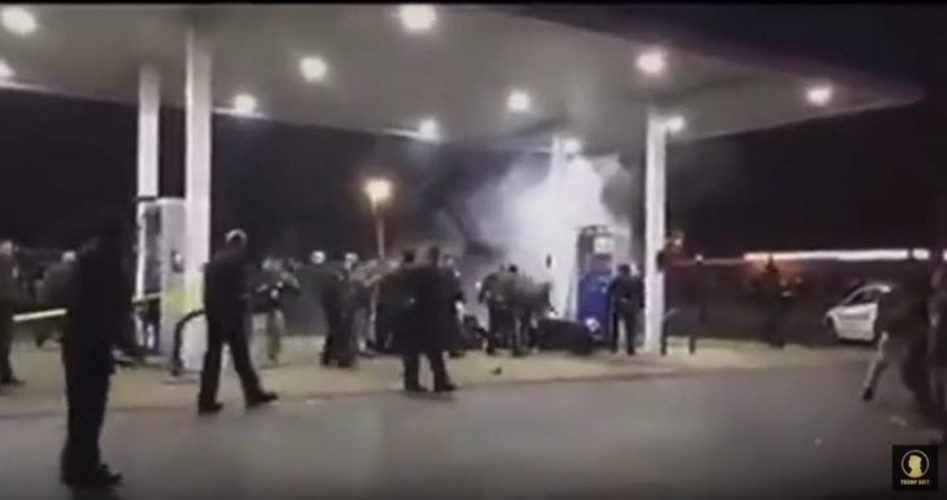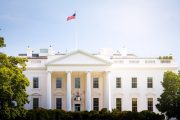
At UC Berkeley on September 14, hundreds of riot-gear-wearing police officers were on hand to prevent leftist violence as conservative speaker Ben Shapiro took to the stage to address a crowd of a thousand devotees and detractors. The police presence at the event was intimidating and, admittedly, a little bit creepy.
Those officers were on hand to protect against leftist violence such as the type that occurred in February before a scheduled Milo Yiannoupoulos event. That event was cancelled due to leftist violence. An Ann Coulter speech in May was also cancelled because of the threat of violence from the mask-wearing leftist group Antifa.
Six buildings on the Berkeley campus were cordoned off to prevent protesters from getting too close to the event. Security perimeters were set up and concrete barriers were put in place in an effort to keep safe those attending the event. And while Shapiro’s speech came off without any major casualties, the massive security presence at the event brings up the question: Is it necessary to make campuses de-facto police states during such events, in order to both honor free speech and guarantee safety at the same time?
The answer, for right now, would appear to be yes.
Ahead of Shapiro’s speech, UC Berkeley Vice Chancellor and Provost Paul Alivisatos sent a letter to the Berkeley community that outlined the security measures for the event. A portion of that letter read as follows:
At 4 p.m. on Sept. 14, UCPD will establish a closed perimeter around Zellerbach Hall and surrounding buildings. Buildings near Zellerbach hall will be closed at 4 p.m., with no access permitted. The perimeter will be assembled over the course of the day starting in the morning. Affected buildings include: Cesar E. Chavez Student Center, Alumni House, Martin Luther King Jr. Student Union, Sproul Hall and Eshleman Hall. There will be a limited number of access points along the perimeter; beginning at 5:30 p.m., a ticket to the event will be required to gain entry into the perimeter.
If that sounds somewhat frightening, the actual footage of the event was no less chilling. Several videos of the inside of the perimeter showed dozens of burly police officers patrolling the area. The common area between the buildings, which should have been teeming with undergrads talking about their professors and what everyone was doing that night, was eerily quiet.
The Shapiro event is only Round One in the current free speech war on Berkeley’s campus. Scheduled for September 24-27 is Free Speech Week, which is being put on by the conservative student newspaper the Berkeley Patriot and Yiannopoulos. Among those scheduled to speak are Yiannopoulos, Ann Coulter, and former Trump strategist Steve Bannon.
Berkeley mayor Jesse Arreguin called for the cancellation of Free Speech Week on August 30, citing security concerns. In addition, over 130 faculty members of UC-Berkeley have called for a boycott of classes and student activities during the event.
As of Tuesday, Free Speech Week was still scheduled to happen, although there is controversy as to whether Yiannopoulos and the Berkeley Patriot turned in certain paperwork and fees in time to secure the venues. Yiannopoulos and the Patriot have claimed that the UC-Berkeley administration has been less than forthcoming in answering repeated inquiries.
Last February, rioters in Berkeley caused over $100,000 in damage to the campus and surrounding businesses over the planned Yiannopoulos event, which ended up being cancelled. And the fight for free speech is not just at Berkeley. Another Yiannopoulos event at UC Davis was cancelled in January because of leftists’ protests. Mask-wearing protesters attempted to stop former Trump campaign manager Corey Lewandowski from speaking at the University of Chicago in February. In March, author Charles Murray was physically accosted by vicious protesters at Middlebury College in Vermont.
So Berkeley can expect more of the type of police presence in the upcoming week in anticipation of Free Speech Week. Some students have been complaining about the campus being “militarized.” At least one Berkeley professor cancelled classes for the day of the Shapiro event, stating in an e-mail to students, “I’ve heard from some of your classmates that they do not feel safe coming to a militarized campus on Thursday. Given the reality of what’s going on, I don’t feel it’s ethical to hold class when some are not in a position to attend.” The professor’s e-mail may have been a ridiculous overreaction, but it does give some insight into the thought processes of the leftists on campuses.
With that thought process in mind, it is imperative to give speakers such as Ben Shapiro, Ann Coulter, and Steve Bannon the opportunity to speak with students. And to do that, at least for now, measures such as those taken for the Shapiro speech at Berkeley seem to be necessary. With groups such as Antifa pledging violence to stop the exercise of free speech, it would seem only prudent.





